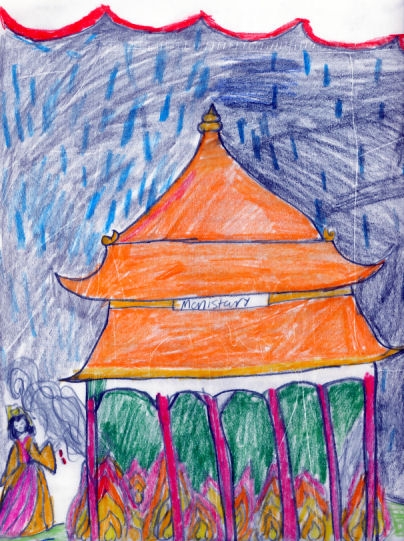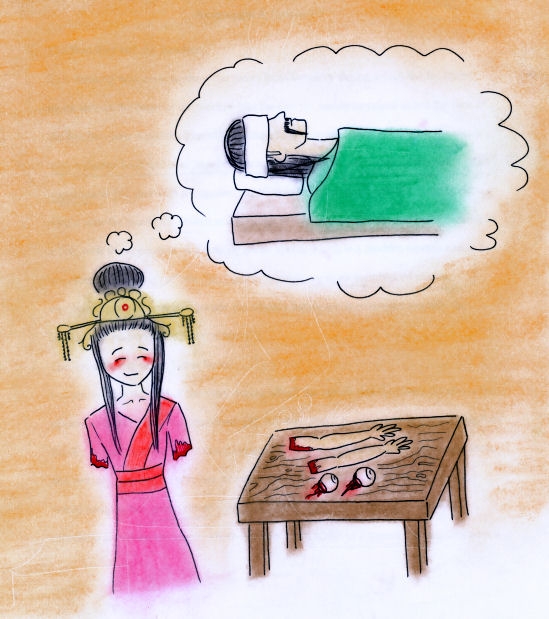
“The king ordered that the monastery be burnt down.”
(Drawing by Andriana S. Ferguson, Sixth College,
UCSD, Class of 2019, by permission.)
Avalokitesvara = an Indian male bodhisattva
Guānyīn 观音 (= Guānshìyīn 观世音) = his Chinese equivalent (usually female)
Miào Zhuāng 妙庄 = a severe and oppressive king with three beautiful daughters
Miào Shàn 妙善 = the youngest daughter, a dedicated Buddhist
Commander Wéi 韦 = an infatuated military man
Across China, people worship a bodhisattva (púsà 菩萨) named Guānyīn 观音. In China in recent centuries, artists have represented Guānyīn as female, but people say she is really Avalokitesvara , an Indian male bodhisattva who was believed to lead people to salvation by ferrying them across the sea of karma and of the cycle of life and death using his “barque of salvation” (cíháng 慈航) to bring them to the Pure Land (jìngtǔ 净土), the Land of Joy (lètǔ 乐土).
People say that the name Guānyīn comes from the Indian name Avalokitesvara beause Avalokita means “look on” (guān 观), and svara means “sound” (yīn 音), as in the sound of prayers. So both in Chinese and in Sanskrit, the name means “perceive sounds.” Others say it is an abbreviated form of Guānshìyīn 观世音, “perceive the sounds of the world.” Sometimes they add the title Zìzài 自在, which is said to come from a Sanskrit word for “sovereign.”
These people are probably not wrong. But in China there is another story too:
In the Eastern Zhōu 周 dynasty, when many warlords contended to reestablish central control of China after it had fallen into chaos, there reigned in a northern state a terrible king called Severe King Miào Zhuāng 严王妙庄 (reign 04c-3). (If the story were set in India — and some say it really should be — perhaps he was the famous Subhavyuda. But we said this was a Chinese story.)
The king was cruel to his subjects and scourge of his enemies. He ignored human misery, and, like other terrible monarchs, believed that no sacrifice was too great for others to make to contribute to his power and glory.
Late in life, and after considerable anxiety about not having children, King Miào Zhuāng had three very beautiful daughters: Miào Yù 妙欲, which meant “Wondrous Desire,” Miào Yīn 妙音, which meant “Wondrous Sound,” and Miào Shàn 妙善, which meant “Wondrous Virtue.” He married the eldest to a famous scholar and the second to a famous general. But his favorite was Wondrous Virtue, whom he intended to marry to his brilliant military commander, Commander Wéi 韦, who had long been infatuated with her, and who had all the talent to be a suitable successor to the throne. The notion of the throne going to the husband of the youngest daughter naturally did not please the older girls and their husbands, who were quite resentful. (Succession didn’t actually work that way, but this is a story, after all.)
Miào Shàn, however, was attracted to Buddhism and preferred the life of the convent, so she refused to consent to marriage, despite the pleas of her family, the insistence of her father, and the elegant bearing and arresting good looks of Commander Wéi.
Favorite daughter or not, Miàoshàn’s resistence to his will much displeased the king. Furthermore, she was horrified at the king’s cruel and callous treatment of prisoners, and even of his own villagers. And she intervened with him constantly on their behalf, until she gradually fell out of favor with him.
To punish her, he consented to let her join a convent, where he made sure that she was assigned the most difficult and degrading work in hope that she would give up Buddhism and behave properly.
But she performed her burdensome duties without complaint —some people say she even had help from various spirits— and she remained defiant. Worse yet, she began to attract a following of peasants as word spread of her attempts over the years to intervene on their behalf. Meanwhile in the palace, her sisters and their husbands were delighted at her fall from her father’s favor, for it reduced the risk of his marrying her to Commander Wéi and then passing on the throne to him.

Some people say the king then ordered that the monastery be burnt down, but no sooner was the fire set than Miào Shàn pricked her finger with a hairpin, and as blood began to flow so a heavy rain began to fall and put out the fire befrore it had done any damage.
Her popular following grew and she didn’t seem to be suffering nearly enough, and so finally, the king ordered her beheaded as a treasonous criminal. When they tried to behead her, the sword shattered into small bits. So he ordered her strangled, and she died. However when her soul reached hell, her great virtue transformed the place to paradise where the souls who had been sent there for punishment ceased to suffer. The king of hell, to save his realm, returned her immediately to life to get her out of there.
And so it was that she appeared rather abruptly on Pǔtuó 普陀山 island, not far from where Shànghǎi 上海 is today. There she lived for nine years, healing people, and saving sailors from shipwreck, and preaching about the Buddha. And tradition holds that it was on Pǔtuó that she achieved enlightenment.
Some people say that Commander Wéi, moved by her sincerity and repelled by the king, went to Pǔtuó island and joined the same monastery.
Meanwhile her father continued in his cruelty and in his growing hostility to all things Buddhist. But at length his karma caught up with him, as karma always does. He fell terribly ill, and the best doctors could not heal him, even when he threatened to behead them. Finally one of them conceded that there was one possible medicine for his condition, but it would have to be concocted from the eyes and hands of a loving daughter. (Some people say that the doctor who said this was bribed by Miào Shàn’s enemies at court, but who could be so terrible? That is the sort of thing the king himself might have done, but none was as cruel as he! Others say that the doctor was none other than a transformation of Miào Shàn herself, determined to set off a chain of events that would advance the teachings of the Buddha.)
So the king sent a messenger to Miào Shàn hoping to prevail upon her filial piety so that she would pluck out her eyes and chop off her hands and thus preserve his life a little longer.

Miào Shàn, being a person of wondrous virtue, just as she was named, was therefore naturally a person of wondrous filial piety, as well as a Buddhist who knew that a body is of little value in the great scheme of things. So she plucked out her eyes, and she had her hands chopped off —some people say Commander Wéi tearfully did the deed for her. She sent them to her father to be cooked into medicine, and then she died. Fully recovering, the king was also moved, perhaps for the first time in his life, by his daughter’s self-sacrifice and her virtue, and so he decided to devote his remaining days to promoting Buddhism.
In commemoration of her great sacrifice, he ordered a statue made of her. After some thought, he commanded that it be made with “intact arms and intact eyes.” The phrase he used, if we pronounced it today, would be “quánshǒu-quányǎn” 全手全眼. Now as it happens, quán means “intact,” but it sounds much like qiān 千, which means “thousand.” And in those ancient days the sounds were even more similar than they are nowadays. (Furthermore, the king probably had a funny accent. Chinese monarchs tended toward that.) The startled sculptor, afraid to ask for clarification from the terrifying king, made the statue with a thousand arms, each with an eye in the palm of its hand.
So that is how Miào Shàn is sometimes represented today, and such a statue is called a Thousand-Handed Guānyīn (Qiānshǒu Guānyīn 千手观音). It’s not bad, really, for each hand can hold a magical weapon with which to defend Buddhism and save humanity. And each eye can help her to see suffering wherever it is found.
Some people say Commander Wéi is the same general who is known today as the handsome Bodhisattva Wéi Tuó 韦驮 (or more properly 韦陀), the defender of all Buddhist temples against the entry of untoward forces, whose statue is usually not far from that of his admired Guānyīn.